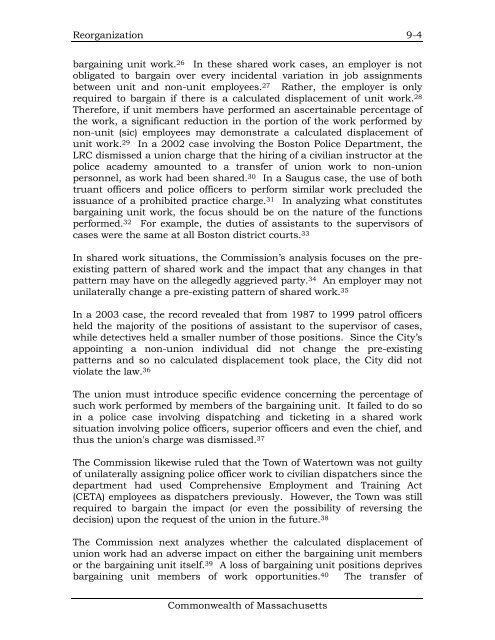Management Rights - AELE's Home Page
Management Rights - AELE's Home Page
Management Rights - AELE's Home Page
You also want an ePaper? Increase the reach of your titles
YUMPU automatically turns print PDFs into web optimized ePapers that Google loves.
Reorganization 9-4<br />
bargaining unit work. 26 In these shared work cases, an employer is not<br />
obligated to bargain over every incidental variation in job assignments<br />
between unit and non-unit employees. 27 Rather, the employer is only<br />
required to bargain if there is a calculated displacement of unit work. 28<br />
Therefore, if unit members have performed an ascertainable percentage of<br />
the work, a significant reduction in the portion of the work performed by<br />
non-unit (sic) employees may demonstrate a calculated displacement of<br />
unit work. 29 In a 2002 case involving the Boston Police Department, the<br />
LRC dismissed a union charge that the hiring of a civilian instructor at the<br />
police academy amounted to a transfer of union work to non-union<br />
personnel, as work had been shared. 30 In a Saugus case, the use of both<br />
truant officers and police officers to perform similar work precluded the<br />
issuance of a prohibited practice charge. 31 In analyzing what constitutes<br />
bargaining unit work, the focus should be on the nature of the functions<br />
performed. 32 For example, the duties of assistants to the supervisors of<br />
cases were the same at all Boston district courts. 33<br />
In shared work situations, the Commission’s analysis focuses on the preexisting<br />
pattern of shared work and the impact that any changes in that<br />
pattern may have on the allegedly aggrieved party. 34 An employer may not<br />
unilaterally change a pre-existing pattern of shared work. 35<br />
In a 2003 case, the record revealed that from 1987 to 1999 patrol officers<br />
held the majority of the positions of assistant to the supervisor of cases,<br />
while detectives held a smaler number of those positions. Since the City’s<br />
appointing a non-union individual did not change the pre-existing<br />
patterns and so no calculated displacement took place, the City did not<br />
violate the law. 36<br />
The union must introduce specific evidence concerning the percentage of<br />
such work performed by members of the bargaining unit. It failed to do so<br />
in a police case involving dispatching and ticketing in a shared work<br />
situation involving police officers, superior officers and even the chief, and<br />
thus the union's charge was dismissed. 37<br />
The Commission likewise ruled that the Town of Watertown was not guilty<br />
of unilaterally assigning police officer work to civilian dispatchers since the<br />
department had used Comprehensive Employment and Training Act<br />
(CETA) employees as dispatchers previously. However, the Town was still<br />
required to bargain the impact (or even the possibility of reversing the<br />
decision) upon the request of the union in the future. 38<br />
The Commission next analyzes whether the calculated displacement of<br />
union work had an adverse impact on either the bargaining unit members<br />
or the bargaining unit itself. 39 A loss of bargaining unit positions deprives<br />
bargaining unit members of work opportunities. 40 The transfer of<br />
Commonwealth of Massachusetts
















